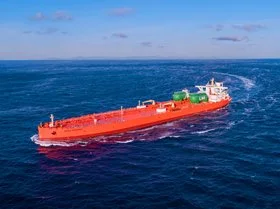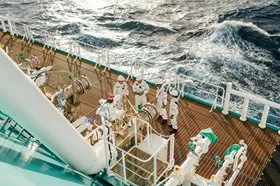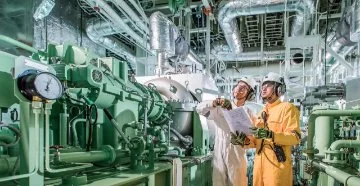Turning uncertainty into confidence
As world trade and shipping volumes continue to grow, efficiency improvements on the current fossil-based technology can only maintain shipping emissions at current levels but not reduce them. At MISC we’re turning this dilemma into an opportunity to decouple business growth from our carbon emission levels through efficiency measures. Accelerating these efforts helps us move to new zero-carbon fuels and encourage supply chains to equally lower their carbon emissions.
Discover more about our decarbonisation mission at MISC.

Building a Sustainable Future
Developing next-generation vessels for 2050
New vessels for use in 2050 must be developed now, given a vessel's 20-25-year lifespan. The following five to 10 years are crucial. We are investing in innovation and fleet technology to improve the technical and financial viability of decarbonised solutions. We cannot do this alone; research and development are critical for meeting this ambitious target. We will work closely with our stakeholders, including researchers, technology developers, business partners, cargo owners, and regulators, to achieve sustainable solutions that benefit the maritime industry.
Promoting energy transition through circular economy
We are committed to promoting the energy transition by embracing circular economy principles. Through innovative and sustainable practices, we aim to maximize resource efficiency, minimize waste generation, and reduce our environmental footprint. By closing the loop and fostering a circular economy mindset, we can accelerate the shift towards renewable energy sources, create new economic opportunities, and contribute to a more sustainable future for generations to come.
Our commitment
- Transition to low-carbon operations
- Deploy zero-carbon emission vessel by 2030
- Decarbonised shipping operations by 2050
- Net-Zero GHG emissions by 2050
Our initiatives
SHIPPING OPERATIONS
- Short term (2021-2025) - Medium Term (2021 - 2030)
- Continuous improvement in energy efficiency design and operation
- Progressive fleet renewal to low-carbon fuel
- Collaboration with strategic partners on developing zero-carbon emission vessels
- Long Term (2031 - 2050)
- Progressive fleet renewal to zero-carbon emission vessels
- Nature-based carbon removal
NON-SHIPPING OPERATIONS
- Improve energy efficiency in operations
- Increase usage of renewable energy mix
Our contribution to UNSDG
- Design and operate assets that can combat or reduce the effects of climate change
- Design or retrofit sustainable assets which optimise resource-use efficiency with greater adoption of clean and environmentally-sound technologies

Talent Excellence
Driving decarbonisation through talent and innovation
Our pursuit of decarbonisation relies on continuous innovation and improvement in energy efficiency designs and vessel operations. Collaborating with strategic partners, we aim to develop zero-carbon emission vessels. To achieve our goals, we are strengthening our talent bench with individuals who embrace digitalisation opportunities and share our commitment to decarbonisation. Together, we will drive positive change towards a sustainable future.
Decarbonisation pathways
MISC is actively pursuing decarbonisation pathways to achieve a sustainable future. Through innovative approaches and strategic initiatives, we are dedicated to reducing carbon emissions and advancing sustainable practices in the maritime industry. By investing in cutting-edge technologies, collaborating with stakeholders, and implementing efficient operational solutions, MISC is committed to leading the way towards a greener and more sustainable shipping sector.
The shipping industry has been labelled the “hard-to-abate” sector. However, at MISC Group we have accelerated and scaled up progress with operational efficiency solutions to make decarbonisation possible. The opportunity to break the deadlock is now clear, and momentum is building.
Our vessels are subjected to rigorous monitoring of their energy efficiency performance via analytical tools that provide data insights on the efficacy of the voyage, engine, and vessel systems. The monitoring enables informed interventions to be made for energy efficiency improvements. We are progressively implementing advanced technologies, such as optimised newbuild designs, anti-fouling paints, and energy-saving fittings throughout the fleet.
Our commitment to decarbonisation and net-zero is not limited to shipping. All operations will adopt technological innovations on existing and new assets, including company-owned building designs, to improve energy-efficiency and reduce emissions. We also plan to use more renewable energy.
We installed solar panels on our Marine and Heavy Engineering Business (MHB) yard rooftops in 2021 and will replicate this across other facilities as part of our renewable energy expansion program.
We offer low-carbon designs to customers for all new assets at our offshore operations. These operations will also explore powering selected energy-intensive equipment with renewable energy on offshore assets to reduce carbon emissions.
Proactive and committed to decarbonisation
MISC is one of the six strategic partners to the Global Maritime Forum (GMF) with a mission to shape the future of global seaborne trade to increase sustainable long-term economic development and human wellbeing.
Getting to Zero Coalition is an alliance of more than 150 companies within the maritime, energy, infrastructure, and finance sectors, supported by key governments and international governmental organisations.
The Coalition is committed to developing commercially viable deep sea zero emission vessels powered by zero emission fuels and bringing them into operation by 2030.
The Castor Initiative is a collaboration between MISC Berhad, Samsung Heavy Industries (SHI), Lloyd’s Register (LR), MAN Energy Solutions, Yara International ASA (Yara), and the Maritime and Port Authority of Singapore (MPA) to develop a zero-carbon ammonia-fuelled tanker.
Our News
Sustainability news
Keep up to date with our latest sustainability initiatives and learn about the different ways we’re making a global impact.
Sustainability Report
View our sustainability report
Gain an in-depth understanding of how we are building a better and more sustainable world through our business operations. This Sustainability Report outlines our material environmental, social and governance (ESG) performance and our forward-looking commitments within the context of the maritime industry.




